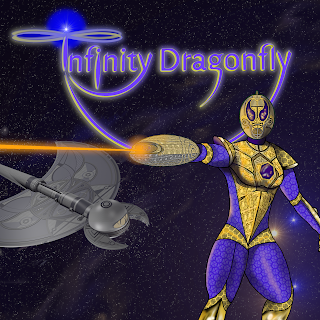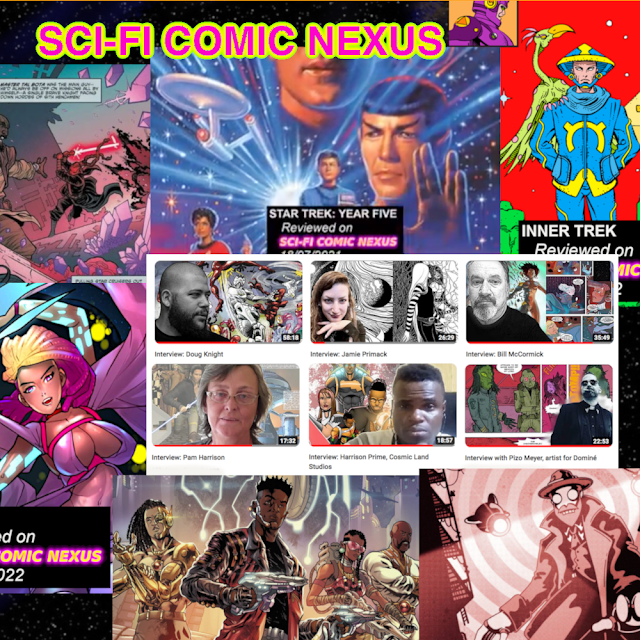Review: Black Panther: The Intergalactic Empire of Wakanda
Comixology recently made an exceptional decision. In the wake of the passing of actor Chadwick Boseman all Black Panther comics are available to download for FREE.
What could be better than free comics? Free sci-fi comics, of course! Here at the Nexus we prefer space warriors to superheroes, but in the Marvel universe the line between these genres is often blurred, and this is one such occasion.
First, a little background for those not familiar with the history of this particular title...
The hero Black Panther was created by Marvel's Stan Lee and Jack Kirby, first appearing in 1966. This was the first black superhero in a mainstream comic, a bold move at a time when it was uncertain how this would be received by the readership. The Civil Rights movement was ongoing at this time. To put this in context, this was one year before Loving v. Virginia, the US Supreme Court's ruling that laws banning interracial marriage were unconstitutional.
Lee and Kirby wanted to make their comics more inclusive, and the importance of this decision cannot be overstated. Institutional racism was blatant, segregation was very real and black children growing up and watching TV, films and reading comics saw virtually no positive role models to inspire them.
King T'Challa was the antidote. Ruler of the most technologically advanced nation on Earth, Wakanda in Africa, he is also a warrior, taking on the role of the Black Panther as an embodiment of the highest values of his culture.
The nation of Wakanda exists in isolation from the rest of the world, having never fallen victim to colonising Western empires. It is the only location on Earth where the metal vibranium can be found; a material that has very special properties and the reason for Wakanda's prosperity and technology.
This was a big deal in the Sixties, and the comic soon gained a large following. Not only was T'Challa fighting super-powered villains, he was also fighting oppression, stereotyping and the whole psychological edifice of Western racism. As a temporary member of the Avengers, and also in his own publication, he soon became a popular mainstay of the Marvel universe.
It's a legacy that holds true to this day. Bigotry has not gone away. Notably in the USA - where African-Americans make up a disproportionately large number of people shot dead by the police - the crossed arms "Wakanda Forever" salute has been taken up by many protestors, including the Black Lives Matter movement. We still need black heroes, as much now as ever.
In the 2018 series The Intergalactic Empire of Wakanda from writer Ta-Nehisi Coates and artist Daniel Acuña, T'Challa's story is expanded to a much grander arena. Two thousand years ago (via a wormhole in spacetime) a group of Wakandans travelled to a distant galaxy and established an empire spanning five galaxies. An empire founded upon brutal military conquest... and slavery.
The slaves (referred to as "mules") are routinely mind-wiped to make them easier to control. One nameless man is troubled by dreams of a white-haired woman who pleads with him to come home to her... Possessed of an innate sense of pride, he fights back against the slave drivers with uncanny strength and skill. He is soon liberated by the rebels ("Maroons") and joins their fight against the evil oppressors. Thus begins his quest to destroy the empire, which is closing in on a new galaxy, one which contains the world they call Wakanda Prime ... known to many of its inhabitants as 'Earth'. The man is given the name T'Challa by one of his compatriots, who believes that this stranger may, somehow, be the actual original king of legend...
In typical Marvel style, it is a huge energy blast of action with lots of fighting, explosions, excitement, dazzling technology and photogenic men and women pitted against archetypal superbaddies (the alien goons do, of course, have fangs). It is also a complex narrative that promises a generously long story arc for the readers to get lost in as T'Challa simultaneously follows a parallel quest; the search for his own identity. The futuristic panorama is an artful blend of science with notes of African culture (including categories of spacecraft called Masai and Zulu).
And that's not all. There is a touch of wisdom here as Coates explores the theme of imperialism, and some may not welcome his portrayal of black humans as slave owners. But here we have the power of the science fiction genre as a mirror that shows us elements of the human condition that cannot easily be seen close up. A little departure from reality can give us a broader perspective on what is real... Turn things upside-down (humans as the 'alien' invaders) and suddenly we see those elements in sharper relief. The final irony here is, of course, that bigotry itself has no colour.
Acuña's style perfectly matches the sprawling epic, his panels bursting with the energy of savage fight scenes and spacecraft racing at breakneck speed across the pages. His tight line art is brought to life by colours that are rendered like brushstrokes and used skilfully to emphasise different moods. His novel spacecraft designs will tick your little geeky boxes, too.
Timely, but also timeless, this is a sci-fi comic saga that plays on many levels and delivers on all fronts. Our stories are a vital part of our cultures and our lives; so much more valuable than just pure entertainment. Here is one that takes a legendary icon and throws him into a new universe of adventures for all generations to enjoy.
Download the series for free HERE. Note: the graphic novel compendiums are NOT free, only the original issues.
Zak Webber




Comments
Post a Comment